Speakers
📢 Here are the current speakers we have for this event. We will also hear from you – the event is all about taking part.
Solving the Sudoku of Creativity vs Media
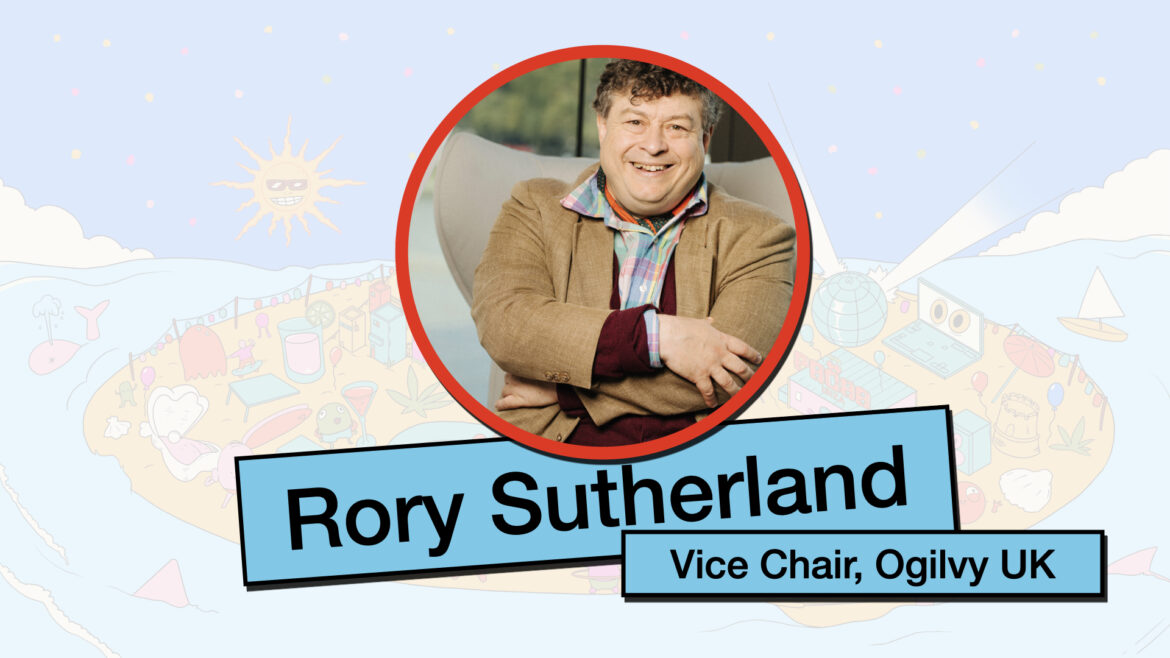
Agencies aren’t as creative as they once were.
Whether that’s because of an over-bloated market, the rise of AI, or a lack of effort – it’s anyone’s guess.
But Rory Sutherland, vice chairman and creative director at Oglivy UK, has a more comprehensive theory.
“Media agencies and platform owners have become so overly focused on profitable algorithms that they’re leaving the creative side of advertising underfunded and undervalued,” says Rory.
“It’s easy to get a budget for creative-free media; it’s almost impossible to get funding for media-free creativity. This does not only come at the expense of brand-building ads, it also comes with something much worse – a massive loss of insight.”
Rory named this situation a ‘Sudoku’ problem: problems that can only be solved by understanding an entire system, not by optimising each part separately.
“I call them Sudoku problems because, like a Sudoku, you can only solve them by contemplating the grid in its entirety – not by cutting the grid into nine separate squares and handing each one to a separate specialism to solve. You could try doing that but, once you reassembled the grid, it would be a mess.”
“Media and creative are effectively in a Sudoku relationship – the targeting and the message are interdependent.”
Rory believes that separating the creative from the media side of things has caused a disconnect – meaning less effective campaigns. There needs to be more funding for creative so the campaigns can speak for themselves, as well as a shift in perspective from short-term branding to long-term.
👉 At the Ibiza Super Summit, Rory will be joining us to walk us through his Sudoku theory, the patterns he’s noticed in marketing’s lack of genuine creativity – and, more importantly, how we can go about fixing it.
Finding the Funny in Everything
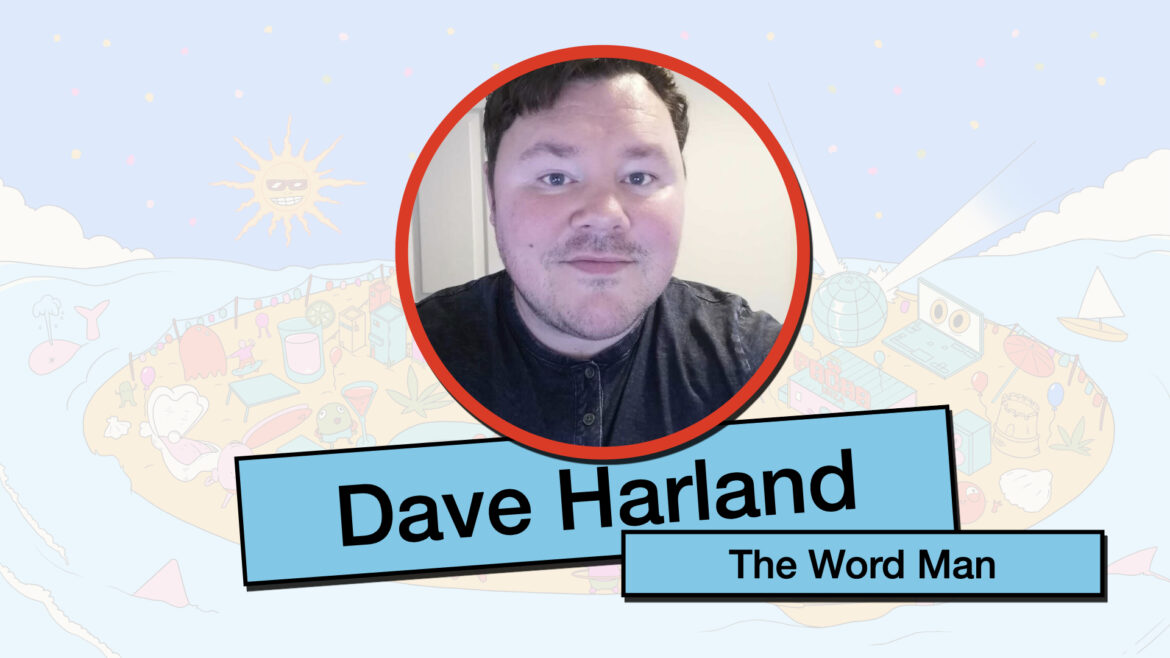
When Dave Harland, creative director at Copy or Die, was 15, his new English teacher opened his eyes to a startling revelation:
It’s okay to laugh at yourself.
“We were all standing outside of the classroom,” tells Dave. “There were audible gasps from me and my classmates because he had the biggest, most bulging eyes any of us had ever seen.”
“He said, ‘I know I’ve got massive eyes, you can laugh about it today, but any more after this and you’ll be in detention’. From that day on, we respected him because he could have a bit of a laugh at himself.”
It was from this that Dave’s perspective on writing changed forever.
Brands like RyanAir, Aldi and Surreal are the masters of finding the funny in their own brand identities.
“The two big questions you’ve got to ask if you want to have a bit of a laugh at yourself is, what are your flaws?” he says. “Are those flaws going to damage your relationship with your target audience?”
Dave says there are plenty of ways to add humour into your copywriting – whether it’s by picking ‘fights’ with other brands, or just making the odd play on words to make people smile.
But the principle is: if you show a little humour, your audience are more likely to notice you, remember you, and trust you over time.
👉 At the Ibiza Super Summit, Dave will be walking us through how to find the funny in everything, and how your copywriting and branding can benefit from just a small perspective shift.
How to Find the Ideal Agency Acquisition
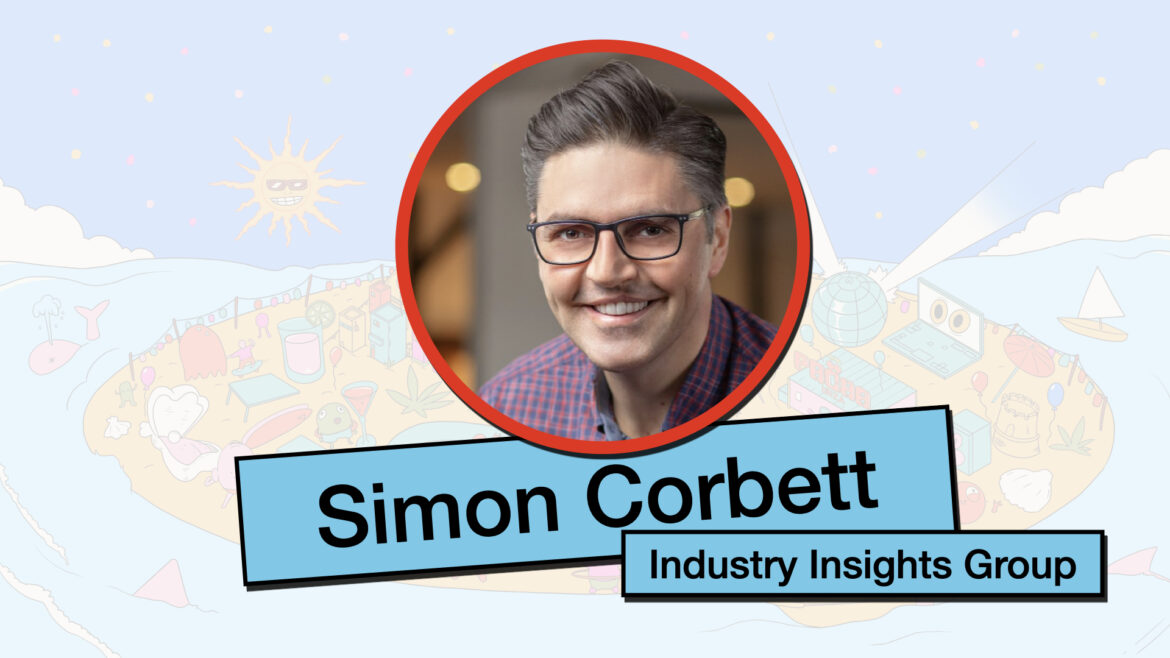
After 10 years of running his agency, Simon Corbett, founder and CEO of the Industry Insights Group, was frustrated.
“I was just getting fed up with all this 10%, 15% growth,” says Simon. “It was all a bit limp, boring, and slow. I wanted to do more – and quicker.”
It was through this boredom that Simon decided to start learning more ways to earn money and grow as a business.
From here on out, he would set his sights on the world of acquisitions.
“I just started learning, reading books, listening to podcasts; I put myself on a couple of different courses about acquisitions and how to buy and build businesses,” he explains. “I tried to get in with other people doing this, to learn from them, and I developed a sort of buy and build strategy.”
Eventually, after acquiring businesses between £150,000 and £600,000, he began hunting for bigger deals.
It was time to upgrade.
“We’re primarily looking for agencies that are about a million a year in fees,” says Simon. “Because in terms of due diligence processes, legal fees, accountancy, spending time with everyone – the same amount of work goes into a quarter million agency as a 2 million agency. So I’d rather do bigger deals than smaller deals.”
But it wasn’t just about the money. There were other priorities at hand:
- Retaining key talent – “Our focus was very much on retaining the people, the talent, telling them that actually this is a great opportunity for them.”
- Partnering with clients – “We’ve got bigger clients; bigger brands; bigger names; more offices; more opportunity; and we pay better. There’s lots of stuff that we can offer that their current employer doesn’t. So let’s partner up and do it together.”
👉 At the Ibiza Super Summit, we’ll be having an in-depth conversation with Simon, drawing on his story to find out some of the best practices and processes of acquiring agencies, and how to go about getting it right.
Why Becoming a B-Corp Leads to 23% More Client Revenue
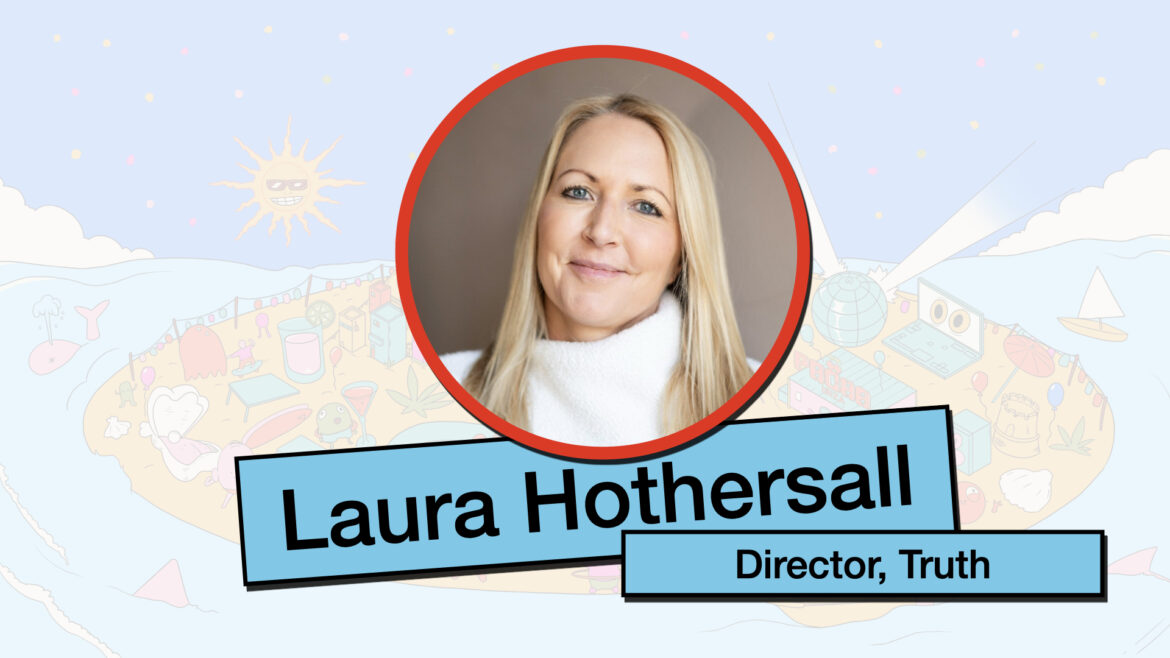
While B Corp is mainly about purpose and values, agency decision-makers are more likely to be convinced by its commercial benefits.
Laura Hothersall, director at Truth (helping businesses achieve Bcorp certification), understands this. Prior to running Truth, Laura was MD at Clicky. Clicky is a Bcorp and Laura led their process.
“What we experienced was increased client revenue, new client wins, employee retention and attraction.In her new role at Truth she wants to help agency owners become B Corp certified not only because it is about purpose and planet, but because it is a certification for the for-profit sector that has a direct impact on revenue growth.
“I see it from a commercial angle,” says Laura. “And I think the benefit of my experience makes it more relevant to agency owners.”
So, what are the commercial benefits of becoming a B Corp?
- Boost revenue – B Corp can bring you 23% more client revenue
- Attract purpose-driven clients – “We found recruiters and clients were asking whether we were B Corp yet, and if not, why? ”
- Provides a framework for continuous improvement – “It’s not about saying you’re perfect right now – you do an impact report every 12 months, and recertify every three years. It’s a journey, a gradual progression of getting better.”
Laura offers a range of services to guide agencies through the B Corp process with 3 levels of support.
- Training for your team.
- Workshop + GAP and action report.
- Truth takes care of the process in its entirety.
👉 At the Ibiza Super Summit, Laura will be joining us to discuss the benefits of becoming B Corp certified, whether it’s right for your agency, and how you can go about doing it.
“What We’ve Learned From Making 700 Outreach Attempts Per Day“
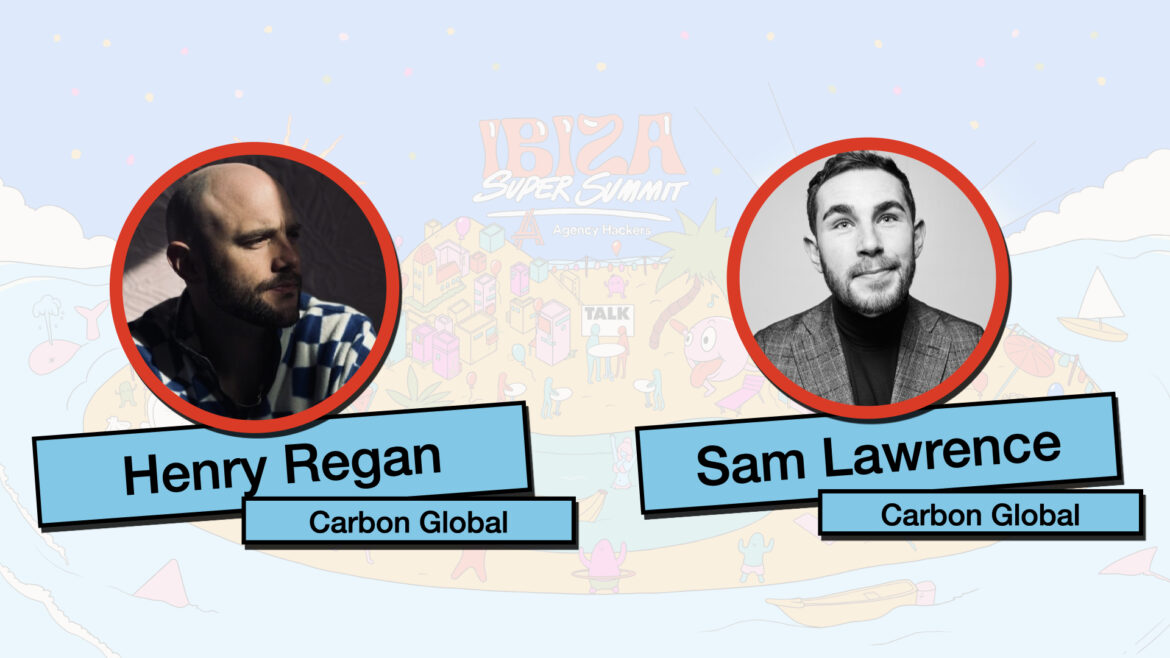
“Prospects get at least 30 calls a day from agencies,” says Henry Regan. “At that point, you shouldn’t be selling – you should be seeing if there’s synergy between you.”
When everyone else is trying to sell to their prospects with charm, the best tool at your disposal is transparency.
No one knows this better than Henry Regan and Sam Lawrence from Carbon Global – who focus on providing value to their clients, rather than aggressive sales tactics.
“Our USP is that we let our clients watch us work,” says Henry, managing partner at Carbon Global. “We don’t report to them, they literally watch us work from Google Sheets 24/7, because we don’t have anything to hide.”
“If they see me fail, within a pre-set boundary, then that is meant to be. Failure is just innovation.”
It’s a refreshing approach, and it drives results. With 16 clients across different sectors and 700 outreaches per day, they’ve developed their own tactics for keeping their sales pipeline moving:
- Always follow up – “If a prospect says to call back at a specific point, you need to do it. You’ve got to do better at keeping the ball rolling after the meeting.”
- Give early-stage leads attention – “The biggest opportunities are down at the bottom of the funnel. You need to treat them as if you’ve just pitched them.”
- Implement structured processes – “Humans like structure, so making sure you follow up and have good CRM processes is crucial.
The driving force of these tactics is their dedication to transparency and value. Without them, they would crumble.
👉 Join us at the Ibiza Super Summit where Henry and Sam will be joining us to discuss how they’ve kept their business development pipeline moving so consistently, and how you can implement the same strategies.
GROW UP: How We Matured As An Agency by Bringing in a CCO
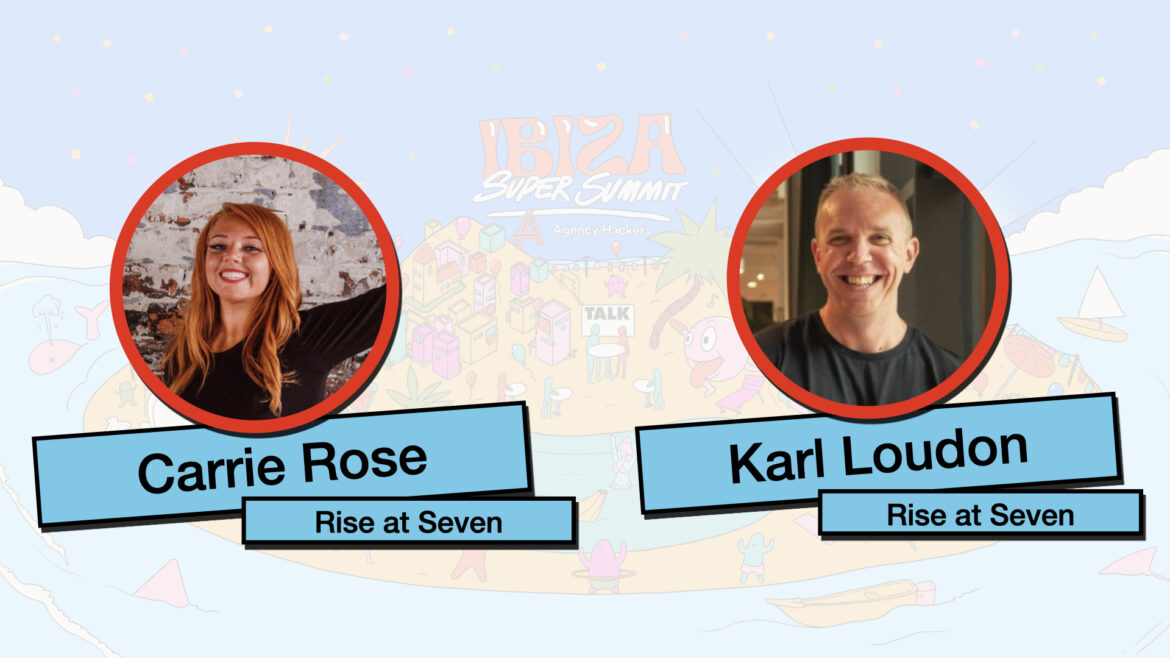
Some agencies struggle to relieve themselves of their growing pains, still clinging onto their teenage phases.
But not Rise at Seven.
In 2019, CEO Carrie Rose co-founded the agency and it grew at an exceedingly rapid rate. But nobody could have prepared her for the rapid growth coming her way.
About three years in, after realising her co-founder’s priorities were elsewhere, she bought him out.
But alas, they continued to grow, and with it came more unexpected change – from a global pandemic.
Despite these obstacles, Rise at Seven had grown to £7 million by 2022. But now, two more problems had now arisen:
- They had too many people.
- Carrie was exhausted.
Enter: Karl Loudon, the now CCO.
“I met Carrie for a drink, and we hit it off very quickly,” says Karl. “It became very clear that she had a commercial gap in the leadership of the business, and I’m a very commercial, growth-oriented person. We ended up putting processes in place to track the pipeline, win rates, and financial reporting.”
“The company had suffered some natural attrition, but it kind of righted itself without having to make any redundancies – which is lovely.”
By 2023, they’d shrunk back down and restabilised at £5.5 million in revenue, now on track to grow back to £7 million – only in a healthier way.
Carrie and Karl attribute some of this success to the team’s ability to embrace change and adaptability.
“Everybody’s incredibly open – most businesses aren’t, and I speak from a lot of experience of years being in different agencies,” admits Karl. “Most people don’t like change, but at Rise, everybody’s quite up for it.
“Because of how Carrie commands herself, nobody is afraid of going, ‘Okay, yeah, let’s try it that way tomorrow.’ And that seems to have stuck; we’re going to hang on to that for as long as we can.”
👉 At the Ibiza Super Summit, Carrie and Karl will be joining us to tell the story of how they managed to grow their agency to the level it is now – and how they overcame the obstacles that every agency faces when maturing.
What I Learned Selling My Small Agency

Holly Tennock didn’t plan on selling her agency – yet in 2019, she did just that.
But it didn’t turn out to be the dream everyone told her it would be…
Far from it.
“I just didn’t sleep,” says Holly.
“I had the worst ‘decision hangover’ ever. My anxiety yelled at me 24/7, ‘You’ve made the wrong decision, you’re going to let everyone down.’ All the problems that I’d been neglecting because I was too busy being a founder had suddenly come to the surface.”
The pressure of the sale, the culture shock, the imposter syndrome – it all became too much. It became increasingly difficult to prioritise herself.
“Looking back, I no longer saw myself as an entrepreneur,” she admits. “I didn’t have that same group of people around me, and all of a sudden I was going through this really difficult time and I was disconnected from the one community that gave work meaning to me.”
It all came to a head when, during her earn-out period (where the agency seller continues to work for the acquiring company for a period of time after the sale), Holly was pitching to a company that outsourced back, hip and knee operations – all of them spinal surgeons.
At the time, her back was causing her severe pain – she was unable to stand up or sit down.
“I was hopping, visibly trying to hide the pain in my face,” she says. “I just tried to ride it out. Afterwards, I remember one of the surgeons saying, ‘Are you okay? You shouldn’t be here.’ And in the end I just quit.
“I missed out on a bunch of bonuses and returns that could have been coming my way, but I was too exhausted to care at that point.”
“I completely stopped having the use of my right leg and ended up in a wheelchair. Even today my leg is still numb because of the nerve damage the delay caused.”
Now that she’s in a better place, she’s able to reflect on the lessons she’s learned:
- Don’t neglect your health and self-care for a future payout.
- Get continuous coaching support during the earn out, not just before selling.
- Maintain the networks and support systems post-acquisition that give your work identity.
As the Founder of Wilder Work, her driving force is helping other agency founders not end up in the same difficult situation she went through after selling.
👉 Join us at the Ibiza Super Summit to hear Holly’s incredible, jaw-dropping story about her experience selling her agency. She’ll be there to share what she learned and to answer any questions you might have.
How to Grow on LinkedIn (& Not Embarrass Yourself Doing It)
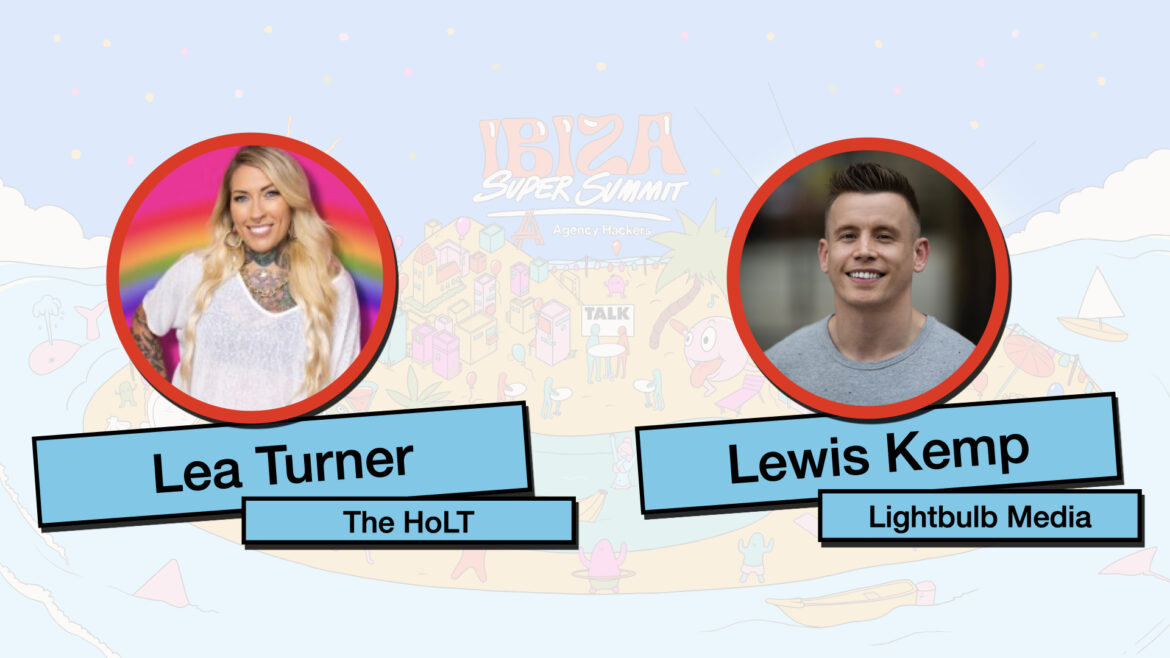
LinkedIn can feel overwhelming, filled to the brim with posts from ‘thought leaders’ and influencers.
So how can you succeed on the platform when there’s seemingly so much competition?
And how do you do so without feeling embarrassed?
Lewis Kemp, CEO of Lightbulb Media, says that in order to stand out, you should write in the way you speak, rather than using stodgy corporate language.
“I initially thought LinkedIn was full of grey haired, corporate kn*bs,” says Lewis. “I started doing what everyone else did: shared blog posts and spoke like I’m from the 1800s. But honestly? That just started annoying me.”
“So I just thought, ‘Screw it. What’s the worst that can happen? I’m going to start writing like I speak.’”
In the same vein, Lea Turner, founder and director of membership community The HoLT and well-known LinkedIn trainer, believes that being your authentic self is one of the top priorities for success on the platform.
“You need to be true to yourself, and follow people that you genuinely find interesting and entertaining,” advises Lea. “Don’t overthink your content, either; it doesn’t all have to be super insightful all the time, and you don’t have to follow the influencer templates.”
So what should you actually focus on?
- Don’t get hung up on the wrong metrics – “I think a lot of people get so hung up on the platform metrics – the likes, followers and impressions. You need to find your voice first, and then measure the metrics that matter.” – Lewis
- Be consistently present as much as possible – “You get better and faster at creating content the more you do it, and the more you post, the easier it becomes to understand what works to get you the results you want”
- Don’t be afraid to repel some people – “Unless you pay me or you’re related to me, I don’t really care about your opinion. So, if you want to attract the people you want to attract, you need to repel everybody else. You’re not going to please everybody and you’ll burn yourself out trying”
Lea says you’re going to feel like an imposter at times, or like you’re making yourself look silly – but the same could be said for anything else you try for the first time. Few of us are great at things as soon as we start.
“Everybody thinks that they have to be perfect to be relevant on LinkedIn,” she says. ‘But no one has to be perfect. No one is perfect. And perfection isn’t relatable”
👉 Join us at the Ibiza Super Summit, where Lea and Lewis will be on hand to offer some sage LinkedIn advice to anyone who’s looking to grow their personal brand but need that extra push to do so.
How to Get the Most Out of Your Social Media Marketing with No budget
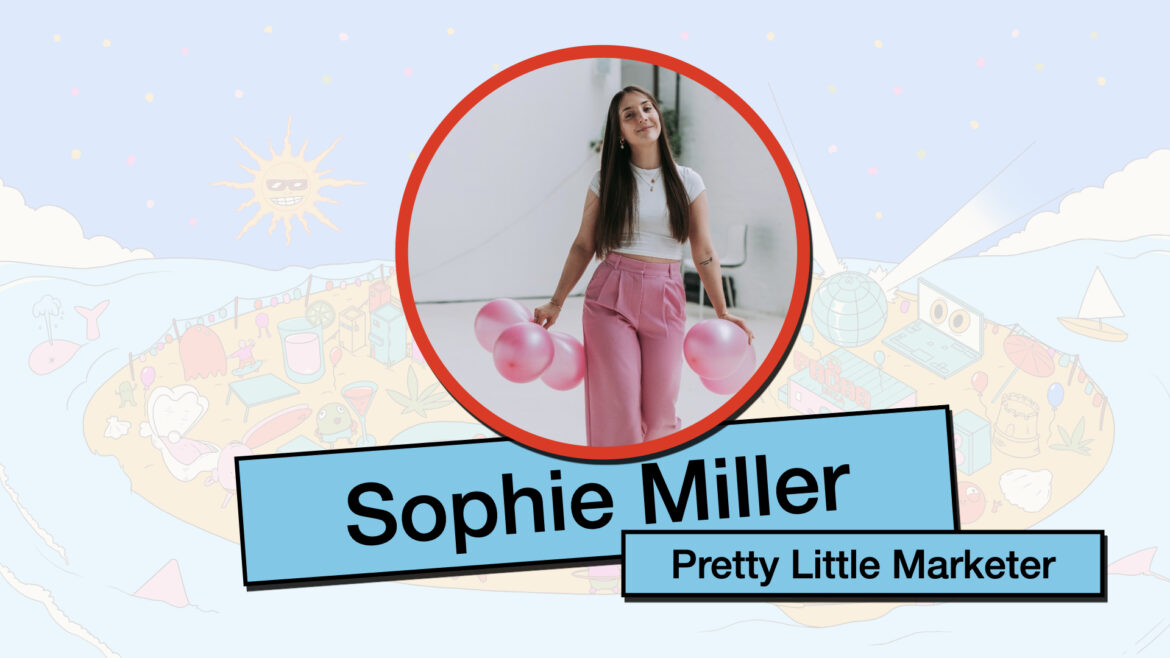
Building a community brand on social media can be daunting.
Trying to do so without a solid budget is even scarier… but not impossible.
No one knows this more than Sophie Miller, director at Pretty Little Marketer, who has mastered the art of building a community of 500,000 people through just organic marketing.
“If you don’t have a budget, you don’t want to be spread across five different platforms because you won’t have time,” explains Sophie.
So how do you figure out where to put your time and effort?
- Understand your message and audience – “Yes, please algorithms, but first and foremost, please your direct audience.”
- Content goals – “Give each piece of content a goal, rather than expecting and hoping that all of your posts will do the same thing.”
- Find the channels that work for you – Sophie says you don’t have to spend days on TikTok if you don’t want to, “You can make organic marketing work for you and the brands you work for.
Sophie says you have to view your followers as more than just followers. You should be building trust with them and building a community around your brand –sing your content and interactions so they’ll get to know and love you.
“I consult with brands on how to do all of this,” she says. “I love people and I love marketing, and I feel like community is the two married together.”
“I believe that community is the future in every sense of marketing. So the more you prepare now, the less you’ll get left behind later.”
👉 At the Ibiza Super Summit, we’ll be joined by the one and only Sophie Miller to help you build more brand awareness through organic marketing and community. If you’re constantly juggling budgets and marketing ambition, this is the one for you.
Why Agency Owners Should Take on Board Positions
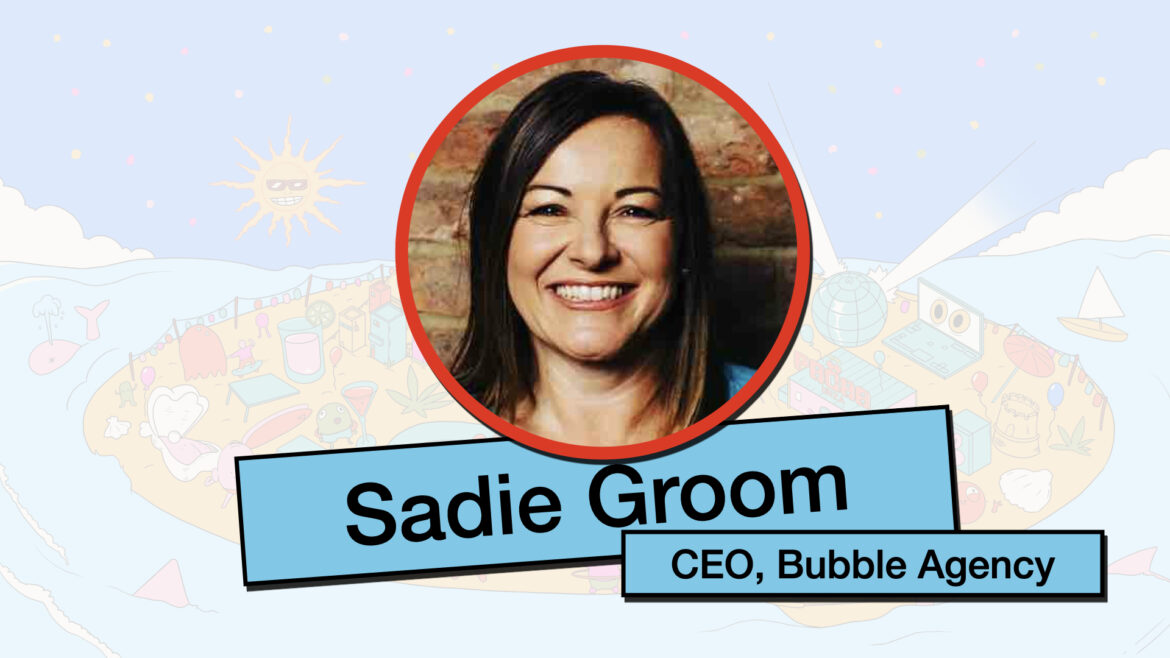
“When you’ve been an agency owner and you’ve walked away with a pot of cash, your brain doesn’t turn off,” says Sadie Groom, CEO of Bubble Agency.
This is a problem a lot of exiting agency founders find themselves in. They sell their business, work their earnout, and… then what?
What are you meant to do once you’ve done everything?
For Sadie, the answer lies in board roles. She currently sits on three boards, including a university board and a hotel board.
Agency owners, she believes, shouldn’t wait until their exit to start thinking about this next step.
“A lot of agency owners go, ‘Oh, I’m going to get on a board after I’ve sold my agency.’” says Sadie. “But they’ve just left it too late by then.”
There are several reasons for agency owners to pursue board roles earlier in their careers. Here’s why:
- Expanded horizons: “You meet so many different people from different walks of life; you expand your career and your network. There’s so much that you can do.”
- Supplemental income: “I know people that are paid like £200,000 a year by being on four boards.”
- A different pace: “When a board meeting is done, the company has the long action list, not me, as we are there to govern, advise, and question, which is totally different. It’s the dream, isn’t it?”
“It’s the people that you meet on these boards. I’ve met some fascinating people and just learned about different businesses,” adds Sadie.
👉 At Ibiza Super Summit, Sadie will discuss how to apply and prepare for board roles, the skills agency owners bring to the table, and how to leverage board experiences to enhance your current agency leadership.
Whether you’re planning your exit strategy or looking to diversify your experiences, this session will provide valuable insights into life in and beyond agency ownership.
The Creds Clinic
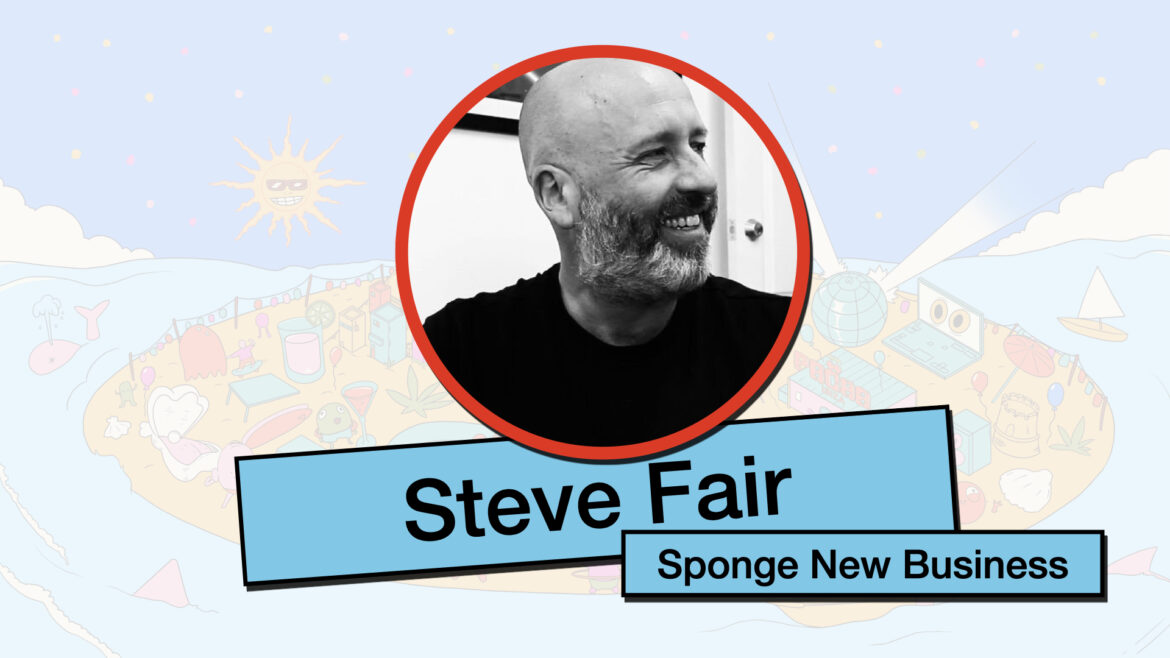
If you want to win more business, then your creds need to be: *chef’s kiss*.
This doesn’t mean just having excellent work, it means speaking the language of clients – demonstrating the commercial incentive for why they should choose you.
That’s where Steve Fair comes in.
“The people that don’t like the work don’t tell you,” he says. “But if you can show increased sales, two new sites, and increased market share, it doesn’t matter if they like the work – because they’d love some of that.”
Whether it’s pitch decks, showreels, email copy or landing pages, Steve believes it’s most important to translate your ideas into their language.
One of the most important things he says is to keep it concise – about four to seven pages. And prioritise the information that will advance you to the next stage.
“The prospect will have so much choice, they’ll be looking to exclude you,” says Steve. “So the more you say, the more the chance there is of them saying no.”
When you’re so close to a project, it’s hard to view it from an unbiased angle. You’ll feel tempted to include everything so that the client doesn’t miss anything important.
Here’s the thing: clients don’t want to see all that. They’ll get annoyed and overwhelmed by it.
“What are you putting in that you just shouldn’t? What’s the real juicy stuff? Try to get the most juice for the squeeze. If they’re going to open your creds deck and see only four pages, which four pages would they be?”
👉 Join us at the Ibiza Super Summit where Steve will be on hand to give you advice on your own creds, offering new insights to help take them to the next level.
